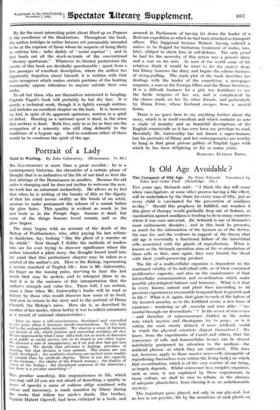" A Noise of Horns and Hunting".
Jorrocks's Jaunts and Jollities and The Analysis of the Hunting Field. By H. S. Surtees. (Eyre and Spottiawoode.
Thoughts upon Hunting. By Peter Beekford. (Cape. 15s.) IT is difficult to modernize an eighteenth-century cottage without turning it into a rather unattractive " maisonette " ; the advent of drains, however desirable hygienically, clashes disconcertingly with superficial aesthetics. Present-day writers en hunting, with a few notable exceptions, must suffer from a similar comparison with their eighteenth and early and middle nineteenth-century predeceisors. The decline in skill is probably symptomatic of a decrease in value of the subject. Without joining the already crowded ranks of laudatores temporis acti, we may assert, whether we deplore or welcome it, that hunting has of late suffered a definite decline in prestige. The storms of controversy which have recently raged over the subject, with all -their gusts of moral and economic considerations, need not obscure the issue. The fact remains that hunting which was more a " national " sport in the eighteenth century than at any other time is now, in. England at any rate, that no longer. A " universal hunting instinct " cannot be pleaded as exouse or explanation for a pastime which attracts only certain members of a certain class, for many of whom the most important moments of the per- formance belong to the hour or so that is spent in front of the mirror before the day's sport is begun.
In the eighteenth century, an age certainly more crude, but probably no more cruel than the present one, hunting was essentially a sport and not a fashionable obligation ; and as such was the background for a living literature and not for a tenuous and rather pathetic revivalism. Consequently, however much, on moral grounds, we may disapprove of venery, we cannot be indifferent to Jorrocks. He is after all, in the best sense of the expression, in the eighteenth-century tradition. To say that the account of his exploits is a sym- pathetic portrait of his times would be to put a tragic limita- tion on its subtleties and beauties. The present two volumes supplement the ten-volume edition of the novels of Surtees published last year. The text of the Jaunts and Jollities is that of the 1869 edition and the illustrations are reproduced front the superb coloured engravings of Henry Alken which first appeared in 1843. The Analysis of the Hunting Field is in text and illustrations identical with the 1846 edition. To those who are acquainted with the other volumes of this edition, further comment will be unnecessary.
Beckford's Thoughts upon Hunting is, though primarily a semi-technical treatise, endowed with a colour and breadth of scope which was denied many of the more strictly professional writers amongst the author's contemporaries. This book is a reprint from the illustrated edition of 1796: and though from a collector's point of view it may be less desirable than the Surtees, it is most attractively produced.
Mr. Harry Buckland, who is the central figure in A Master of Hounds, appeared in Mr. Siegfried Sassoon's Memoirs of a Fox Hunting Man as Harry Buckman. Mr. Buckland is a man who has devoted his whole life to horses, hounds and hunting and has to his name innumerable successes both in the show ring and in racing. This book is the chronicle of his achieve- ments, but considerably more than that : it is a graph of the process of change which has overwhelmed British hunting and British sport in general ; the curve of Mr. Buckland's fortunes is indicative of the mass of new factors which have been applied to an old world.
Mr. Scarth Dixon's book Men, Horses and Hunting resembles A Master of Hounds in many ways. Its appeal, however, will . be more general as its scope is wider. Mr. Dixon's life has ' been a varied and busy one, and many who will not be moved by the second part of his title will find plenty of interest about., the first. By far the most interesting point about Hard up on Pegasus is the excellence of the illustrations. Throughout the book, the author indulges in rather fatuous wit presumably intended to be at the expense of those whom he suspects of being likely to criticise him ; talks daddy of " social reprisal " ; and in fact hauls out all the stock-in-trade of the conventional literary sportsman." Whatever its literary pretensions the merits of this book are decidedly questionable : apart from a few passages of excellent description, where the author has apparently forgotten about himself, it is written with that naive arrogance which makes certain portions of the hunting community appear ridiculous to anyone outside their own ranks.
To all but those who are themselves interested in beagling, Captain Paget's book will ptobably be but dry fare. It is purely a technical work, though it is lightly enough written, and includes an excellent chapter on the hare. It is, however, we feel, in spite of its apparent optimism, written in a spirit of defeat. Hunting as a national sport is dead, in the sense that archery is dead. Both live, only in so far as they are the occupation of a minority who still cling defiantly to the traditions of a bygone age. And to condemn either of them would be to condemn the spirit of the age.















































 Previous page
Previous page